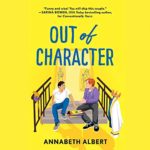Narrated by Aaron Shedlock and Teddy Hamilton
Even though Him, Us and The Understatement of the Year are all on my favourites shelf, romances featuring college-age protagonists aren’t ones I normally pick up. But in the case of Let There Be Light by new-to-me author A.M. Johnson, the draw was twofold – 1.) Teddy Hamilton and 2.) as a classically trained musician myself, I’m interested in stories featuring characters who are musicians. Let There Be Light features two scholarship students – one a champion swimmer, the other a virtuoso pianist – in a charming coming-of-age/coming-out story.
It’s a very low-drama tale that relies more on internal conflicts and issues to drive it forward, and I admit that had I read it, I may have decided it was too slow-moving and not for me. Fortunately, the excellent narration by Teddy Hamilton and new-to-me narrator Aaron Shedlock kept me engaged, although I can’t deny that things dragged a little around the middle and early in the second half.
Royal O’Connell and his twin sister are in their first year at St. Peter’s College, he on a swimming scholarship, she on an art one. Their parents are both artists (and their dad also runs a tattoo shop with one of his brothers) and although money is tight, they’ve grown up in a secure, loving environment and Royal is a well-adjusted young man who works hard at his sport, at getting good grades and is determined to move into adulthood and prove himself to be the man his father has brought him up to be.
Child prodigy Camden Morgan is a piano virtuoso in his second year at St. Peter’s courtesy of a full scholarship, even though his parents – both doctors – could have afforded to pay for his place. But Camden wanted to make his own way on his own merit; his mother wanted him to go to the Julliard School and wasn’t pleased when Camden turned them down. His relationship with his parents couldn’t be more different that Royal’s with his; Camden knows all he’s ever been to them is something to boast about and that they don’t care about him much at all, something that became even more apparent when, at sixteen, he told them he liked guys more than girls and his mother told him he was disgusting and perverted. (I have to add here that I found it hard to believe that a practising psychiatrist would be such a rabid homophobe; surely one would need to be far more tolerant and open-minded to be in that line of work?)
Royal has only ever had one real girlfriend – his high-school best friend – but hasn’t really questioned his sexuality, so when he first meets Camden, he’s surprised to realise that he’s … interested. Camden is shy and serious, and Royal is fascinated by him and his ability to create the beautiful music he hears coming from behind the closed door of his room on the occasions he visits his friend, Kai – who is Camden’s suite-mate and captain of the swim-team.
Over the next few weeks and months, Royal starts to reach out to Camden, gently pulling him out of himself and getting him to do some of the simple things he’s never really done, like go out for pizza with friends or play a game of extreme Frisbee, and the uncertainty they both experience as to how the other feels is nicely conveyed. Royal hasn’t ever been attracted to a guy before, but he’s not hung up on it; all he knows is that he likes Camden and wants to know him, to spend time with him, make him smile and listen to him play. For Camden, however, things are more complicated. His parents are good friends with the Dean of the college, and he’s worried about their reaction should they find out he’s in a relationship with a man; his mother could arrange for his scholarship to be pulled and he’d have to leave St. Peter’s and be dependent upon her again. He also reminds Royal that it won’t exactly be easy for him – an athlete – to come out as gay, given the homophobia that still exists in elite sports.
As the relationship between Royal and Camden develops, Camden starts to break free of the attitudes that have been so deeply ingrained in him and to find a grain of hope that at last, he can be who he wants and have the life – and love – he wants. He’s stunned and delighted at the way Royal’s parents simply accept him as their son’s boyfriend, and starts to realise that for the first time ever, he has people in his life who genuinely care about him and not about what he can do to make them look good. There are, of course, a few bumps along the way – one of the swim-team is a homophobic shithead who was always going to make trouble – but it happens fairly late on in the story and is quickly dealt with, allowing Royal and Camden to enjoy their happiness.
I had a few issues with certain elements of the story. I’ve already mentioned my problem with Camden’s mother – not just that she was a shitty parent, but that she could practice holding such prejudices, and I wonder why the author didn’t just give her a different specialism. I also couldn’t buy that Camden, a virtuoso pianist, would be content to practice extensively on an electronic keyboard in his room. Even if, for the sake of argument, the keyboard in question has the same number of keys as a piano – 88, covering just over seven octaves – (and most don’t) the touch is completely different to an acoustic piano, and any college or university that offers a music degree would have practice facilities with ‘proper’ pianos available that he would surely have preferred to use. Then there’s the fact that the author refers to pieces of music as “songs” all the time, but the pieces referred to, such as Satie’s Gymopédie No. 1 are NOT songs; in fact, classical musicians generally refer to “pieces” not songs (unless they’re actual songs!) and an orchestra does not rehearse a “playlist”, it’s a “programme”. I completely understand that for most listeners, these will be completely irrelevant issues, but for me, they were akin to, I don’t know, calling hockey sticks “bats” or getting terminology wrong in a story about football players.
I picked up Let There Be Light mostly because of Teddy Hamilton’s involvement, and because I’ve been seeing Aaron Shedlock’s name cropping up a lot lately and wanted to listen to him. He acquits himself very well, although he has one particular vocal tick that started to grate after a while; at the ends of most sentences and phrases, his voice has a tendency to tail off so that he ends up speaking in a near whisper. That actually works in certain circumstances, but it happens so often that it’s obviously something he does all the time rather than reserving to create a particular expression or nuance. In all other respects, however, his performance was very good, and I’d definitely listen to him again. Teddy Hamilton is someone I always enjoy listening to and as expected, he delivers a strong performance that clearly differentiates between Royal and Camden and between them and the secondary characters. Both narrators pace their performances well, and deliver believable female character voices, and ultimately, their collaboration is an enjoyable one.
The prose in Let There Be Light is lyrical (although sometimes it was a little too flowery for my taste) and the characters are well-drawn. Add in the strong performances from both narrators, and this is a gentle, poignant New Adult romance that should appeal to fans of the genre.
Caz
Buy Let There Be Light by A.M. Johnson on Amazon




